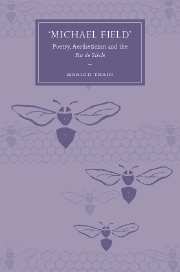Book contents
- Frontmatter
- Contents
- Acknowledgements
- Introduction: ‘something fierce, subtle, strange, singular’
- 1 The diaries and dramas: life-writing and the temporal patterns of aestheticism
- 2 Long Ago: the male pseudonym, fin-de-siècle sexualities and Sappho's historical leap
- 3 Sight and Song: Botticelli and ekphrastic paradox
- 4 Underneath the Bough: dual authorship and lyric song
- 5 Wild Honey from Various Thyme: apian aestheticism and the lyric book collection
- 6 The Catholic poetry: the spiritual and historical ‘turn’ of the century
- Conclusion: modernism and the fin de siècle
- Notes
- Bibliography of material by Katharine Bradley and Edith Cooper
- General bibliography
- Index
- CAMBRIDGE STUDIES IN NINETEENTH-CENTURY LITERATURE AND CULTURE
1 - The diaries and dramas: life-writing and the temporal patterns of aestheticism
Published online by Cambridge University Press: 08 September 2009
- Frontmatter
- Contents
- Acknowledgements
- Introduction: ‘something fierce, subtle, strange, singular’
- 1 The diaries and dramas: life-writing and the temporal patterns of aestheticism
- 2 Long Ago: the male pseudonym, fin-de-siècle sexualities and Sappho's historical leap
- 3 Sight and Song: Botticelli and ekphrastic paradox
- 4 Underneath the Bough: dual authorship and lyric song
- 5 Wild Honey from Various Thyme: apian aestheticism and the lyric book collection
- 6 The Catholic poetry: the spiritual and historical ‘turn’ of the century
- Conclusion: modernism and the fin de siècle
- Notes
- Bibliography of material by Katharine Bradley and Edith Cooper
- General bibliography
- Index
- CAMBRIDGE STUDIES IN NINETEENTH-CENTURY LITERATURE AND CULTURE
Summary
The concerns with patterns of time and history which form the backbone of this study might be thought more intrinsic to the genres of life-writing and historical drama than they are to lyric poetry. Certainly one can see, through an exploration of these themes within the diaries and plays as well as the poetry, a kind of intellectual unity in the writings of Michael Field. Moreover, the experiments in these other genres provide a crucial theoretical frame for reading the lyric poems.
LIFE-WRITING: THE DIARIES AS AUTOBIOGRAPHICAL NARRATIVE
The life-writing of Michael Field has been studied very little; no doubt in part because of the daunting number of hand-written manuscript sources left to us in the archives. My aim is not to offer an overview of that material, but rather to analyse the mode and structures of self-creation and narration which are apparent in Bradley and Cooper's diaries. What we find here are the same preoccupations which shape the literary work. In fact, I will be suggesting that we need to read the diary more as a crafted ‘work’ – as much worthy of literary attention as their poetry and plays – than as an intimate outpouring.
That Bradley and Cooper write the diaries under the name ‘Michael Field’ foregrounds the artificiality inherent in the construction of any life-narrative, and lays bare its methods.
- Type
- Chapter
- Information
- 'Michael Field'Poetry, Aestheticism and the Fin de Siècle, pp. 20 - 41Publisher: Cambridge University PressPrint publication year: 2007



